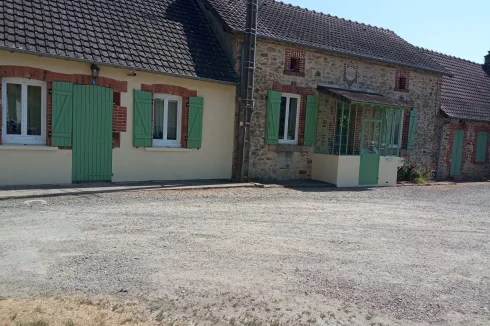The End of French Camembert?
Wednesday 07 March 2018
An agreement reached last month will allow the use of pasteurised milk in the production of AOP Camembert.
It is a dispute that has been going on for over 10 years. On one side, the producers of ‘Camembert de Normandie’, who use unsterilised milk; on the other hand, the ‘Fabriqués en Normandie’ industrial producers using pasteurised milk.
Only the former benefit from the protected designation of origin (AOP), with the traditionalists accusing the latter of misleading the consumer with labelling too close to their own.
However, following round-table talks brokered by the regulatory body the Institut national de l' origine et de la qualité (Inao), use of the term ‘Fabriqués en Normandie’ will end. In return, the AOP specification ‘Camembert de Normandie’ will be relaxed to allow pasteurisation.
The agreement also specifies that at least 30% of the milk must come from cows grazing in Normandy, down from the current minimum of 50%, with a minimum grazing requirement of six months and 2,500m2 per cow. The use of GMOs is banned.
In order to accommodate the prospective increase in production, the permitted grazing area for the cows will be extended to the whole of the department.
Although that would seem to spell the end for unpasteurised Camembert the agreement also allows traditional producers to have a distinctive mention on their cheeses, such as ‘real’ or ‘authentic’. In such cases, 70% of the milk would need to come from Normandy cows, with a minimum of 100 metres of hedgerow per hectare of pasture.
The agreement is far from unanimous, with traditional producers in the Association Fromages de Terroirs stating that: "Décidément, l’histoire se répète. L’AOP normande n’a pas tiré la leçon du passé, elle s’enfonce inexorablement dans la médiocrité."
Unlike many other products with geographic protection, Camembert cheese does not have to come from Normandy, or even France, so many brands produced outside of the area will remain on the market, albeit they will not have the Camembert de Normandie label.
Whether the changes will even be noticed by the vast majority of consumers is questionable, as the industrial producers account for 95% of sales of the cheese, with production overwhelmingly controlled by the dairy giant Lactalis. Their industrial brands include Président, Lanquetot and Lepetit, which are omnipresent in the French supermarkets. They also produce the genuine article under such labels as Domaine du Plessis, La Petite Normande, Jort, and Moulin de Carel.
Around 60,000 tons of pasteurised cheese is produced each year, against only 5,500 tons of lait cru. The sale price of the latter is around twice that of the imposter.
The changes are planned to be introduced in 2021, subject to the detailed elaboration of the new regulatory framework.
Only the former benefit from the protected designation of origin (AOP), with the traditionalists accusing the latter of misleading the consumer with labelling too close to their own.
However, following round-table talks brokered by the regulatory body the Institut national de l' origine et de la qualité (Inao), use of the term ‘Fabriqués en Normandie’ will end. In return, the AOP specification ‘Camembert de Normandie’ will be relaxed to allow pasteurisation.
The agreement also specifies that at least 30% of the milk must come from cows grazing in Normandy, down from the current minimum of 50%, with a minimum grazing requirement of six months and 2,500m2 per cow. The use of GMOs is banned.
In order to accommodate the prospective increase in production, the permitted grazing area for the cows will be extended to the whole of the department.
Although that would seem to spell the end for unpasteurised Camembert the agreement also allows traditional producers to have a distinctive mention on their cheeses, such as ‘real’ or ‘authentic’. In such cases, 70% of the milk would need to come from Normandy cows, with a minimum of 100 metres of hedgerow per hectare of pasture.
The agreement is far from unanimous, with traditional producers in the Association Fromages de Terroirs stating that: "Décidément, l’histoire se répète. L’AOP normande n’a pas tiré la leçon du passé, elle s’enfonce inexorablement dans la médiocrité."
Unlike many other products with geographic protection, Camembert cheese does not have to come from Normandy, or even France, so many brands produced outside of the area will remain on the market, albeit they will not have the Camembert de Normandie label.
Whether the changes will even be noticed by the vast majority of consumers is questionable, as the industrial producers account for 95% of sales of the cheese, with production overwhelmingly controlled by the dairy giant Lactalis. Their industrial brands include Président, Lanquetot and Lepetit, which are omnipresent in the French supermarkets. They also produce the genuine article under such labels as Domaine du Plessis, La Petite Normande, Jort, and Moulin de Carel.
Around 60,000 tons of pasteurised cheese is produced each year, against only 5,500 tons of lait cru. The sale price of the latter is around twice that of the imposter.
The changes are planned to be introduced in 2021, subject to the detailed elaboration of the new regulatory framework.
Thank you for showing an interest in our News section.
Our News section is no longer being published although our catalogue of articles remains in place.
If you found our News useful, please have a look at France Insider, our subscription based News service with in-depth analysis, or our authoritative Guides to France.
If you require advice and assistance with the purchase of French property and moving to France, then take a look at the France Insider Property Clinic.





